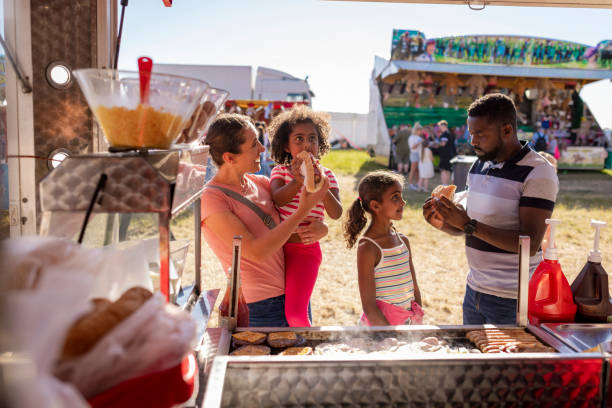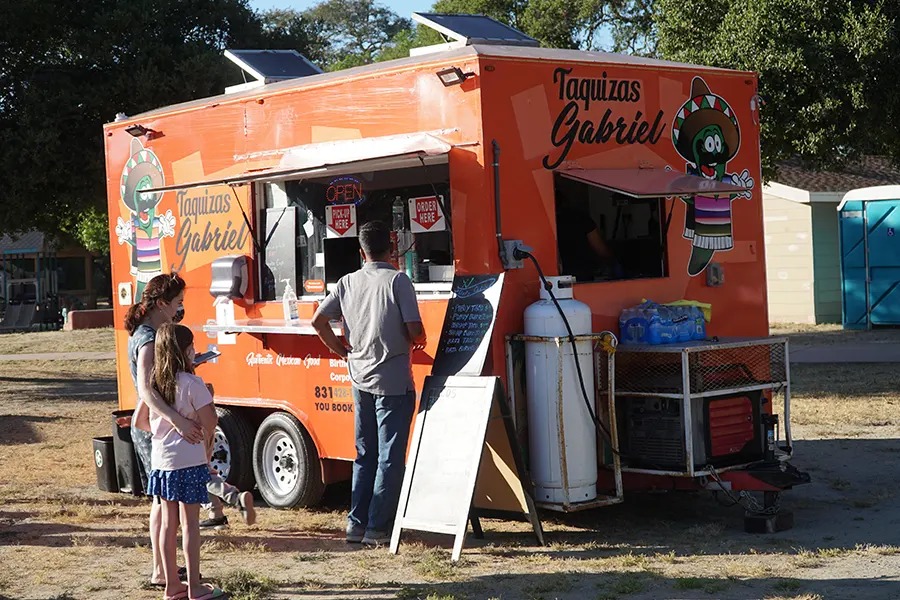इसलिए, you’re thinking about diving into the delicious world of mobile food businesses, huh? Great choice! But here’s the burning question: food trailer vs food truck—which one should you choose? Both have their unique flair and functionality, but understanding their differences can make or break your food venture. इस आलेख में, we’ll dig deep into what defines each option, their pros and cons, and how to decide what’s best for your business. Ready to roll? Let’s get started!
फ़ूड ट्रेलर क्या है?
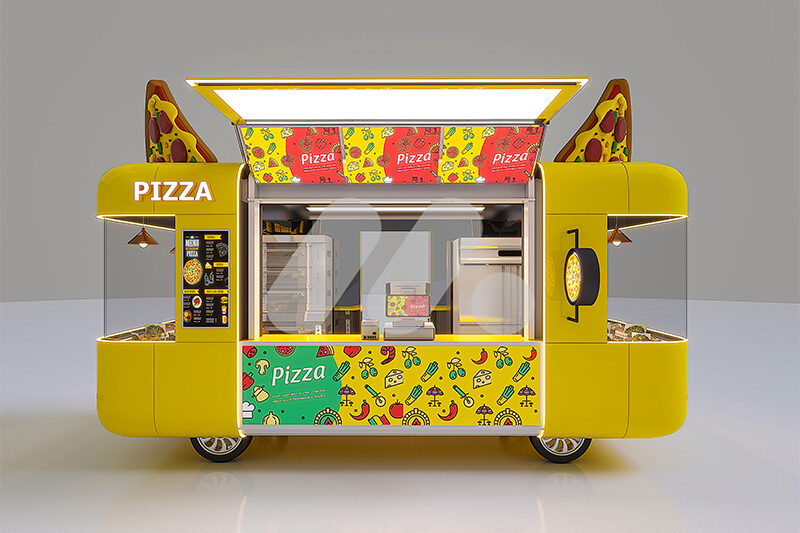
Definition and Features
एक खाद्य ट्रेलर is essentially a kitchen on wheels, but not quite as mobile as a food truck. Think of it as a portable kitchen that requires a vehicle to tow it around. These trailers can vary greatly in size and design, often featuring large serving windows, storage for ingredients, and cooking equipment. They’re designed to be hooked onto a vehicle, making them a fantastic choice for events or gatherings where you can park and serve.
Common Types of Food Trailers
There’s a smorgasbord of food trailer options out there! Some common types include:
- Enclosed Trailers: These offer a fully functional kitchen inside, protected from the elements.
- Open Trailers: Great for serving directly to customers, they often have fewer amenities but provide a more open atmosphere.
- Specialty Trailers: These are designed for specific cuisines or types of food, like आइसक्रीम ट्रेलर, हॉट डॉग ट्रेलर, या taco trailers.
What is a Food Truck?
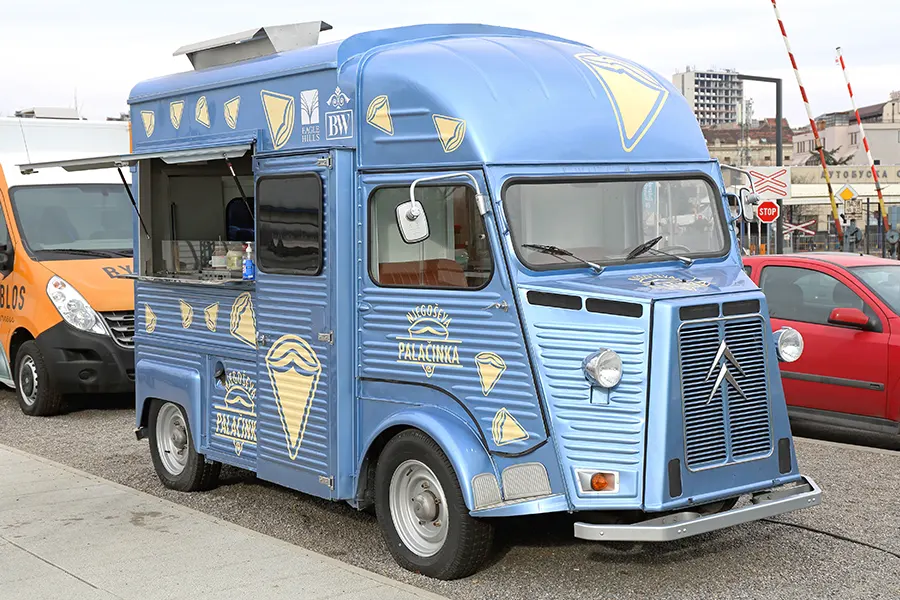
Definition and Features
Now, let’s shift gears and talk about the star of the street food scene—the food truck! This is a mobile unit that’s equipped to cook and serve food on the go. Unlike trailers, food trucks have their own engines, allowing for greater mobility. Picture a small restaurant on wheels; they often come with everything you need to whip up delicious meals right on the spot!
Common Types of Food Trucks
Food trucks come in all shapes and sizes, but some popular categories include:
- Gourmet Food Trucks: These offer upscale menu items, often with a twist.
- Ethnic Cuisine Trucks: Serving up dishes from around the world—think tacos, sushi, or curry.
- मिठाई के ट्रक: A sweet way to indulge, featuring everything from ice cream to cupcakes.
फ़ूड ट्रेलर बनाम फ़ूड ट्रक: Key Differences
When weighing food truck vs food trailer pros and cons, it’s essential to consider factors like mobility, setup time, and operating costs.
Mobility and Setup
When you think about mobility, food trucks take the cake. They can zip around town, finding prime spots to serve customers. Food trailers, वहीं दूसरी ओर, need a vehicle to tow them. इसलिए, if you’re considering a food trailer, you’ll have to plan your setup and get to your location a bit earlier.
Size and Capacity
आम तौर पर, food trucks tend to be smaller but more efficient in layout, allowing for quick service. Food trailers can offer more space but may be bulkier and less efficient for fast-paced environments. If you’re dreaming of cooking for a crowd, consider how much space you’ll need for both prep and serving.
Operating Costs
Let’s talk dollars and cents. Food trailer or food truck—which is more cost-effective? Food trailers usually have a lower initial investment. They’re less expensive to purchase and maintain. But don’t forget about towing costs! Food trucks, while pricier upfront, may offer better mobility and less hassle with setup and permits in some areas.
फ़ूड ट्रेलर बनाम फ़ूड ट्रक: पक्ष - विपक्ष
When considering your options for a mobile food business, you might find yourself asking, “What is better: a food truck or a food trailer?”
Pros of Food Trailers
- Lower Initial Investment: आम तौर पर, food trailers cost less to buy than food trucks.
- Flexible Locations: You can park your trailer in various locations depending on the event.
- Easier to Store: When the day’s done, just hitch it to your vehicle and park it in your driveway!
Cons of Food Trailers
- Limited Mobility During Operations: Once parked, you’re somewhat stationary until you’re ready to leave.
- Requires Towing Vehicle: You’ll need a suitable vehicle to tow your trailer, adding to your costs.
- Setup Time at Events: Getting everything ready may take longer compared to a food truck.
Pros of Food Trucks
- Greater Mobility: They can easily relocate to find the best spots.
- Built-In Kitchen Facilities: Everything you need is right there, making it super convenient.
- Instant Setup: Just park, and you’re ready to serve!
Cons of Food Trucks
- Higher Initial Costs: Food trucks can be pricey, both to purchase and maintain.
- रखरखाव और मरम्मत: You’re responsible for both kitchen and vehicle upkeep.
- Limited Space for Equipment: The compact nature may limit your cooking capabilities.
Which is Better for Your Business?
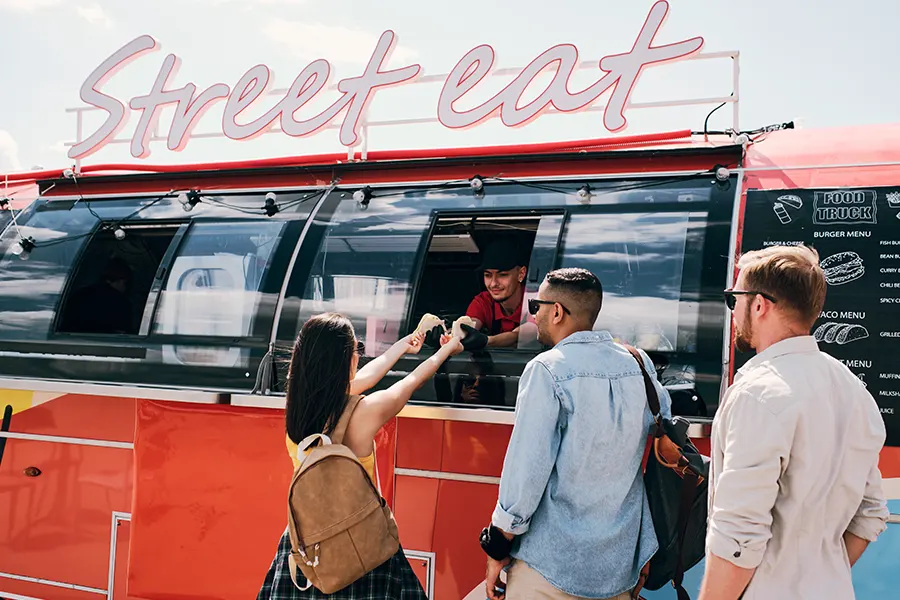
Assessing Your Business Model
Before diving into the world of mobile food service, take a moment to really consider your business model. What kind of culinary delights are you planning to whip up? Are you dreaming of catering to large crowds at festivals and events, or do you envision a more laid-back approach with casual street service?
Understanding the scale and style of your service can greatly influence your choice between a food trailer and a food truck. उदाहरण के लिए, if you want to focus on big events where you can serve hundreds of customers at once, a food truck might provide the efficiency and mobility you need. Conversely, if you see yourself setting up at local markets and fairs, a food trailer could be the perfect fit, allowing you to create a cozy, inviting space for your customers without the need for constant relocation.
Target Market Considerations
Next up, think about who your ideal customers are. What’s your target market like?
If you’re aiming for bustling festivals or busy street corners where quick service is essential, a food truck could be your golden ticket. Food trucks are designed for efficiency, allowing you to serve up delicious meals at a rapid pace while keeping the line moving.
On the flip side, if your strategy involves tapping into steady foot traffic at farmer’s markets or community events, a food trailer might just be the way to go. With more space and a more relaxed setup, food trailers can create an inviting atmosphere that encourages customers to linger, explore your menu, and ultimately make a purchase.
Budget and Financing Options
अंत में, let’s talk numbers. Your budget will be a crucial factor in making this decision. If you’re working with a tight financial plan, a food trailer often comes with a lower initial investment, making it a more accessible option for many aspiring food entrepreneurs.
वहीं दूसरी ओर, if you have some financial wiggle room and are willing to invest a bit more for the sake of mobility and efficiency, a food truck might justify the higher costs. Consider not only the purchase price but also the ongoing expenses, such as maintenance, insurance, and fuel. Balancing your ambitions with your budget will ensure you make a smart choice that supports your business goals in the long run.
निष्कर्ष
Choosing between a food trailer or food truck doesn’t have to feel like choosing between pizza and burgers—it all boils down to your unique business needs. Weigh the pros and cons, consider your target market, and don’t forget to factor in your budget. Once you’ve got that all squared away, you’ll be well on your way to serving up delicious meals on wheels!
पूछे जाने वाले प्रश्न
1. Can I convert a food trailer into a food truck?
हाँ, with the right modifications, you can convert a food trailer into a food truck, but it can be complex and may require significant investment.
2. What permits do I need for each?
Both food trailers and trucks typically need health permits, business licenses, and possibly local vendor permits. Check your local regulations for specifics.
3. How do I choose the right option for my menu?
Think about the type of food you plan to serve. If it requires more extensive cooking equipment, a food truck might be better. For simpler menus, a food trailer could suffice.
4. What are the average costs of each?
खाद्य ट्रेलरों से लेकर हो सकते हैं $5,000 को $30,000, while food trucks can cost anywhere from $20,000 को $100,000 या अधिक, depending on the features.
5. How do they perform in different locations?
Food trucks generally perform better in fast-paced, high-traffic areas, while food trailers are great for events where customers gather for longer periods.

